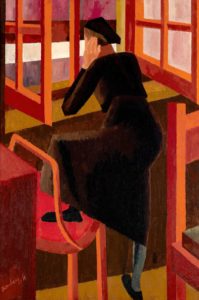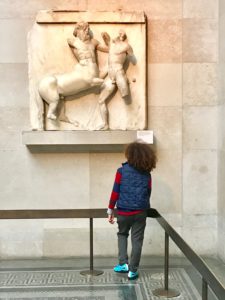A fierce battle rages in our household. We are united in not wanting the Elgin Marbles to be ‘given back’, but we do not agree about the Ben Uri Gallery’s decision to sell off a part of its collection in order to ‘widen its focus’ by extending its patronage to all immigrants, not just Jewish immigrants.
It is not that my husband is against helping non-Jewish immigrants but he is against selling off works of art which, for the most part, have been in the public domain and may now disappear into the vaults of the super-rich.
Of course, this is to simplify both the reasons the Ben Uri has taken this step and the benefits that could accrue from it, as well as the reasons for objecting to it, which are manifold. For one thing, who now will donate works of art to an institution which may choose to sell them off . . . ?

At the Window, by David Bomberg (to be sold at Sotheby’s)
Not long ago, I put stickers on the backs of all the paintings I have been given or managed to buy over the years, so that my son will know which ones not to throw on the nearest skip. For instance, how would he know that the cat painting on the landing, which is part of the furniture of our lives, is of some monetary value because the artist who gave it to me sixty years ago now has works in the Tate?
And how would he know that the charcoal drawing of a stout lady balancing on the edge of a kitchen chair is actually the page of a manuscript which its author tore out and gave to me when I told her how much I liked it. I was returning her manuscript. She was not a writer.

Self portrait in charcoal by Halina Korn
The sticker on the back of this one reads FOR THE BEN URI and, should they want it, they will have it one day. I am sure Halina Korn would like to have her drawing seen by more people than the members of my family, even if the Ben Uri decides not to keep it, but to give it to some other institution where it can ‘generate meaningful public benefit’.
The real scandal is surely not the distribution of works of art but the staggering number of artworks that are kept from public view by the museums. That these should be sent back to their countries of origin, or given to provincial museums, seems too obvious to have to say.
But the Elgin Marbles are not hidden away. They are there for a great many people to see. And, given their history, this seems a fair case of Finders Keepers.
. 
There does come a point where the original owner must back off. Or so it seemed to me when I re-met my Hamley’s dog-on-wheels that was left in Estonia when war began, and which I did not meet again for another thirty years. By then, two other children had thought of him as theirs.

Me on my dog, with my cousin Vicky
Every time I see him, I have a pang of regret, and have to stifle the thought that he really belongs to me. But he no longer does. Nor should he.